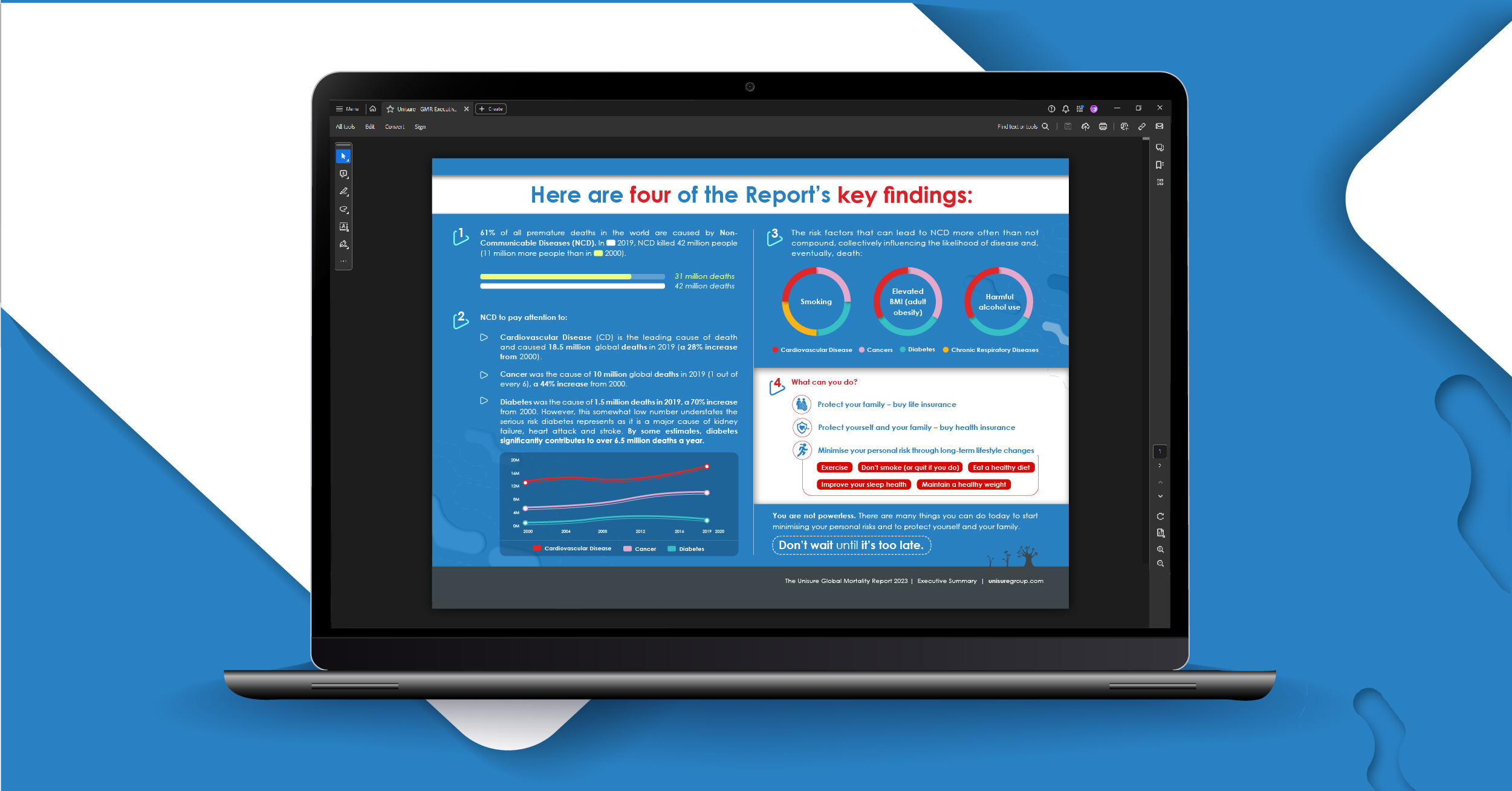Applying insights with intelligence

How research and global health data are refining the Unisure life insurance application process
We released our second Unisure (2023 edition) Global Mortality Report (GMR) earlier this year. It’s a comprehensive report using global data to analyse rapid changes in global causes of death, the prevalence of non-communicable diseases, the cause and effect of key risk factors for death, and what we can do about it.
Besides graphically illustrating the importance of life insurance as one of a family’s primary financial responsibilities, the report also shines a spotlight on a person’s individual risk factors and the powerful effect that their lifestyle choices and behaviour can have on their health and longevity as a whole.
Perhaps most surprisingly, however, the GMR has joined the dots in new ways and sparked important conversations between our Life Solutions division and SCOR, our reinsurance partners.
“An insurance business is a risk management business, and at the end of the day, we need to tailor our risk management accordingly,” explains Aron Sharman, Managing Director of Unisure’s Life Solutions division. “The underwriting behind a policy is vital, as it’s the underwriting that protects your risk pool from the most likely claims.”
In doing research around this year’s GMR, Aron raised an important question around why an HIV test is the starting point in all of Unisure’s individual international life policies, no matter where the potential policyholder resides.
“Roughly 800 000 people die of HIV or AIDS every year, but that pales in comparison to the 18 ½ million people that die of cardiovascular disease annually,” Aron explains. “Of course, when a policyholder comes from a country with a high HIV risk, we’ll test for it, but for anyone else outside of those areas, we’ve now identified and started talks around removing some unnecessary friction from our application onboarding process. Not only that, but the report helped us see that we’re exposed to a much greater and much more widespread risk by way of cardiovascular disease, which is a global concern.”
Making the Unisure international life insurance application as honest, easy and convenient as possible is always the goal, which is why Aron and his team are excited to be investigating new app and web-based technologies that can help identify potential cardiovascular risk in applicants.
“This is a very interesting and exciting development for our company,” he enthuses, “and it happened to coincide with the publication of our GMR and identifying the incongruency that our first and foremost screening test is for a condition which carries a much smaller risk than cardiovascular disease,” Aron explains.
Cardiovascular disease isn’t the only non-communicable disease (NCD) that receives prominence in the report. Cancer was the cause of 10 million global deaths in 2019, a 44% increase from 2000. And diabetes was the cause of 1.5 million deaths in 2019, which is a 70% increase from 2000. Because of the serious risk diabetes represents as a major cause of kidney failure, heart attack and stroke, however, some estimates state that diabetes actually contributes to over 6.5 million deaths a year.
“The compound negative effect of various risk factors combined is startling. Risk factors don’t exist in isolation; it’s very much a case of cause and effect. Consistently having a poor diet, and being obese, as well as being a smoker, and excessively consuming alcohol, all compounds and significantly increases your likelihood of ending up with one or more NCD as you age.”
There are many reasons behind publishing the GMR, one of the most important of which is to educate individuals, brokers and clients around the importance of taking out health and life insurance to protect yourself and your loved ones, and pay attention to what facets of your lifestyle could cost you your longevity. Having said this, the intention is never to preach doom and gloom and paint a picture that is beyond recall.
“Statistically, more than 50% of people alive today will live beyond age 70,” Aron explains, “but, given the rise of NCDs, there is increased individual risk which we need to understand in order to take whatever precautions possible to value our health and wellbeing and protect our families’ financial security.”
To download the Executive Summary of our report, as well as the Full report, click here.
Sources:
- Interview with Unisure Life Solutions Managing Director, Aron Sharman, 11 May 2023



